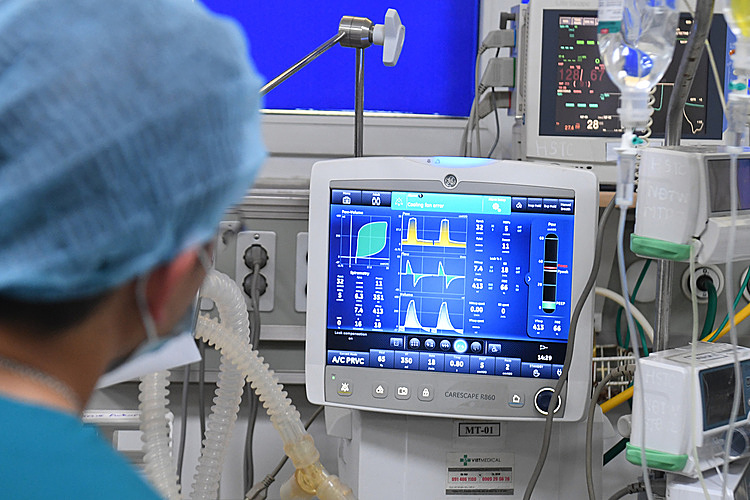The patient was admitted to the National Hospital for Tropical Diseases on 15/9 experiencing abdominal pain, vomiting, fatigue, and loss of appetite. After examination, Doctor Dong Phu Khiem, Deputy Director of the Intensive Care Center, diagnosed him with dengue fever. Test results revealed thickened blood, a low platelet count, and fluid overload from improper intravenous administration.
Dr. Khiem explained that administering intravenous fluids at home without the supervision of medical professionals and specialized equipment carries significant risks. Anaphylactic shock, for instance, can be fatal within minutes. Uncontrolled fluid administration can also lead to fluid overload, resulting in pulmonary edema and heart failure.
The National Hospital for Tropical Diseases has admitted numerous cases with serious complications due to self-treatment. One example is a 55-year-old woman who was diagnosed with dengue fever at a local medical facility but did not receive effective treatment. She was only admitted to the National Hospital for Tropical Diseases when she developed shortness of breath and low blood pressure, at which point her dengue fever had progressed to a severe stage.
Doctors diagnosed the patient with multiple organ failure and severe blood clotting disorders due to dengue fever complications, exacerbated by her underlying diabetes. Despite receiving intensive care, her condition remains critical with a high risk of mortality.
 |
An intensive care doctor attends to a patient. Photo provided by the hospital. |
An intensive care doctor attends to a patient. Photo provided by the hospital.
By the end of July, Vietnam had recorded over 32,000 cases of dengue fever. Southern provinces accounted for over 70% of the total cases. Ho Chi Minh City alone recorded more than 15,500 cases, a nearly 160% increase compared to the same period last year, with 10 fatalities. Several other localities such as Ben Tre, Tay Ninh, Long An, and Dong Nai have also seen a surge in cases.
Nationwide, the number of severe dengue cases has also increased significantly compared to the same period last year. In Hanoi, many outbreak areas have a high mosquito density. According to health officials, the number of dengue fever cases in the capital tends to increase during the peak season, with frequent rain and humid heat creating favorable conditions for disease-carrying mosquitoes.
Dr. Khiem noted that the initial stage of dengue fever often presents mild symptoms such as high fever, body aches, and headaches. After the 4th day, when the fever subsides, most patients will stabilize. However, some patients can develop severe conditions, especially the elderly, those with underlying health conditions, weakened immune systems, or who are overweight or obese.
"This is the most dangerous phase, patients must not become complacent when the fever subsides, as serious complications can arise," Dr. Khiem warned.
The doctor recommends that those who suspect or have been diagnosed with dengue fever should be examined and monitored daily, especially from the 4th to the 7th day of illness. If symptoms such as stomach pain, frequent vomiting, fatigue, bleeding, shortness of breath, chest tightness, or altered consciousness appear, patients should immediately seek medical attention.
Thuy Quynh












